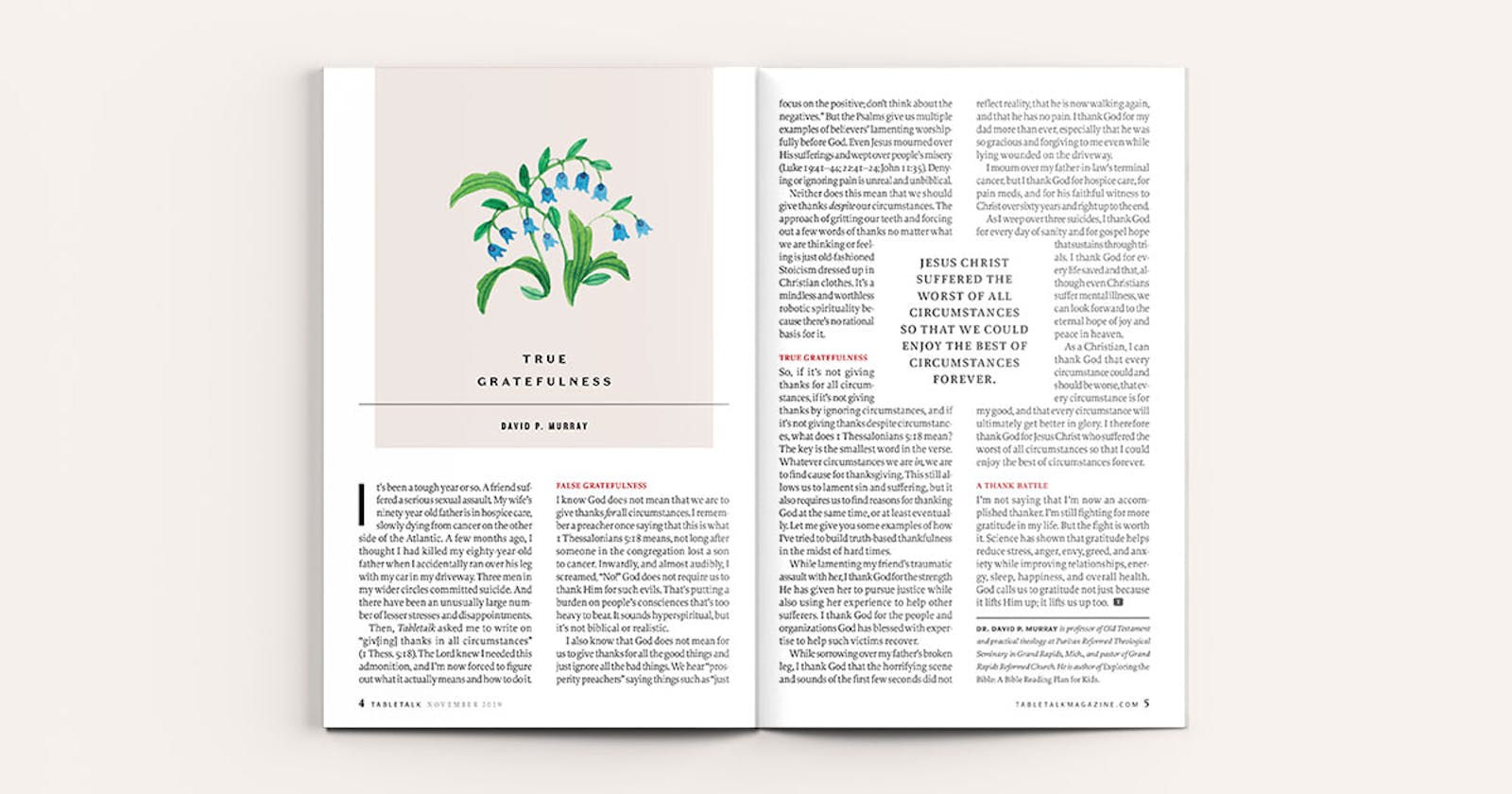
Request your free, three-month trial to Tabletalk magazine. You’ll receive the print issue monthly and gain immediate digital access to decades of archives. This trial is risk-free. No credit card required.
Try Tabletalk NowAlready receive Tabletalk magazine every month?
Verify your email address to gain unlimited access.
It’s been a tough year or so. A friend suffered a serious sexual assault. My wife’s ninety-year-old father is in hospice care, slowly dying from cancer on the other side of the Atlantic. A few months ago, I thought I had killed my eighty-year-old father when I accidentally ran over his leg with my car in my driveway. Three men in my wider circles committed suicide. And there have been an unusually large number of lesser stresses and disappointments.
Then, Tabletalk asked me to write on “giv[ing] thanks in all circumstances” (1 Thess. 5:18). The Lord knew I needed this admonition, and I’m now forced to figure out what it actually means and how to do it.
False Gratefulness
I know God does not mean that we are to give thanks for all circumstances. I remember a preacher once saying that this is what 1 Thessalonians 5:18 means, not long after someone in the congregation lost a son to cancer. Inwardly, and almost audibly, I screamed, “No!” God does not require us to thank Him for such evils. That’s putting a burden on people’s consciences that’s too heavy to bear. It sounds hyperspiritual, but it’s not biblical or realistic.
I also know that God does not mean for us to give thanks for all the good things and just ignore all the bad things. We hear “prosperity preachers” saying things such as “just focus on the positive; don’t think about the negatives.” But the Psalms give us multiple examples of believers’ lamenting worshipfully before God. Even Jesus mourned over His sufferings and wept over people’s misery (Luke 19:41–44; 22:41–24; John 11:35). Denying or ignoring pain is unreal and unbiblical.
Neither does this mean that we should give thanks despite our circumstances. The approach of gritting our teeth and forcing out a few words of thanks no matter what we are thinking or feeling is just old-fashioned Stoicism dressed up in Christian clothes. It’s a mindless and worthless robotic spirituality because there’s no rational basis for it.
True Gratefulness
So, if it’s not giving thanks for all circumstances, if it’s not giving thanks by ignoring circumstances, and if it’s not giving thanks despite circumstances, what does 1 Thessalonians 5:18 mean? The key is the smallest word in the verse. Whatever circumstances we are in, we are to find cause for thanksgiving. This still allows us to lament sin and suffering, but it also requires us to find reasons for thanking God at the same time, or at least eventually. Let me give you some examples of how I’ve tried to build truth-based thankfulness in the midst of hard times.
While lamenting my friend’s traumatic assault with her, I thank God for the strength He has given her to pursue justice while also using her experience to help other sufferers. I thank God for the people and organizations God has blessed with expertise to help such victims recover.

While sorrowing over my father’s broken leg, I thank God that the horrifying scene and sounds of the first few seconds did not reflect reality, that he is now walking again, and that he has no pain. I thank God for my dad more than ever, especially that he was so gracious and forgiving to me even while lying wounded on the driveway.
I mourn over my father-in-law’s terminal cancer, but I thank God for hospice care, for pain meds, and for his faithful witness to Christ over sixty years and right up to the end.
As I weep over three suicides, I thank God for every day of sanity and for gospel hope that sustains through trials. I thank God for every life saved and that, although even Christians suffer mental illness, we can look forward to the eternal hope of joy and peace in heaven.
As a Christian, I can thank God that every circumstance could and should be worse, that every circumstance is for my good, and that every circumstance will ultimately get better in glory. I therefore thank God for Jesus Christ who suffered the worst of all circumstances so that I could enjoy the best of circumstances forever.
A Thank Battle
I’m not saying that I’m now an accomplished thanker. I’m still fighting for more gratitude in my life. But the fight is worth it. Science has shown that gratitude helps reduce stress, anger, envy, greed, and anxiety while improving relationships, energy, sleep, happiness, and overall health. God calls us to gratitude not just because it lifts Him up; it lifts us up too.
